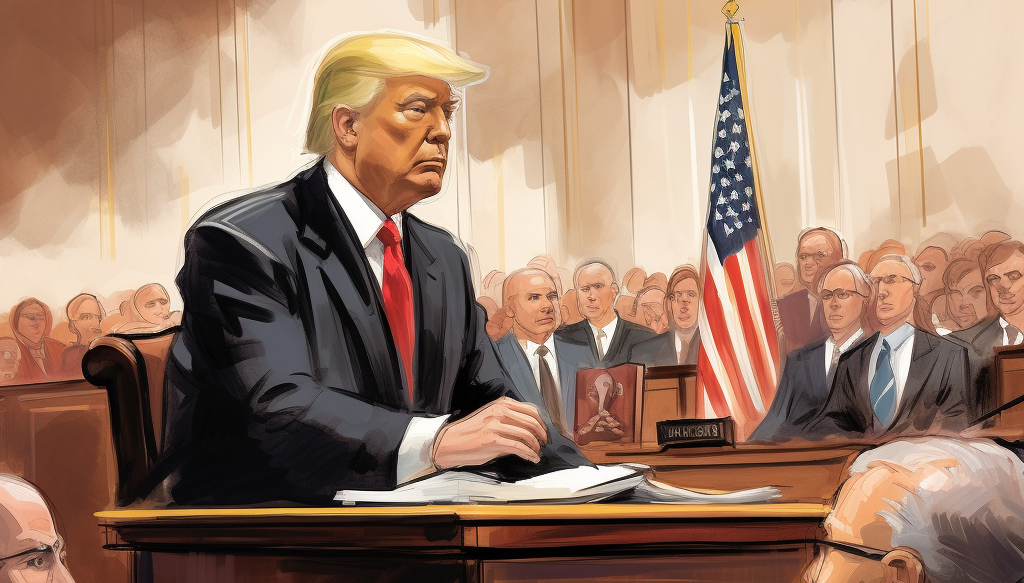Trump Grilled in Court, GOP Endorsement Drama, and Crucial Debates Ahead

Tensions Rise as Trump Testifies in Fraud Case: Donald Trump's contentious testimony in a New York fraud trial saw the former president at odds with the presiding judge, with confrontations hinting at Trump's larger strategy of questioning the legal process's fairness. Trump appeared for about four hours in the New York civil fraud trial on November 6. The former president's testimony included assertions about the value of his properties and criticisms of the justice system. The judge cautioned Trump for making political rally-like statements instead of providing concise answers. Trump contended that inaccurate property valuations provided to banks were not significant, as they included disclaimers of accuracy and were not taken seriously by the banks. This high-profile testimony unfolds as Trump's daughter Ivanka is also slated to take the stand.
Iowa Governor's Endorsement Shakes Up Republican Presidential Field: Iowa Governor Kim Reynolds endorsed Florida Governor Ron DeSantis for the Republican presidential nomination. This key endorsement could significantly impact the primary race, where DeSantis is polling behind the leading contender, Donald Trump. Reynolds' support highlights a potential shift in the party's dynamics, considering Iowa's pivotal role in the early caucus process of the presidential nominating contest.
Guilty Plea in July Fourth Shooting Raises Questions of Parental Responsibility: The father of the accused in the 2022 July Fourth parade shooting in Highland Park, Illinois, has pleaded guilty to reckless conduct. This plea highlights a growing discourse on parental accountability in their children's criminal actions. Robert Crimo Jr. sponsored his underage son's firearm owner's ID application, later used in the tragic event. The case could set legal precedents for future incidents of this nature.
Border Security Plan Emerges as GOP Bargaining Chip in Ukraine Aid Debate: A group of Senate Republicans has proposed a border security plan that emphasizes continuing the border wall construction and tightening asylum processes. The proposal surfaces as part of broader discussions, with Republicans contemplating linking border security measures to Ukraine aid, suggesting a strategic positioning within the ongoing legislative negotiations over national security priorities.
Republican Presidential Hopefuls to Debate Without Trump: The third Republican presidential debate will occur without Donald Trump, featuring Ron DeSantis, Vivek Ramaswamy, Nikki Haley, Tim Scott, and Chris Christie. Each candidate presents distinctive policies and backgrounds, with DeSantis viewed as Trump's primary challenger. The debate will provide a platform for these contenders to differentiate themselves and address the party's direction ahead of the 2024 election.
The Supreme Court Considers Balancing Second Amendment with Domestic Violence Law: The U.S. Supreme Court is set to hear arguments in a case that may redefine the scope of gun rights concerning individuals convicted of domestic violence. The case challenges a federal law that disarms individuals convicted of domestic violence misdemeanors. It has attracted a broad spectrum of views, with some public defenders and a conservative Republican district attorney taking positions that defy the usual partisan lines. The Supreme Court will decide whether the law infringes on Second Amendment rights based on the "historical tradition" of firearm regulation, as established by a recent precedent.
International Pressure Mounts on US to Curb Israeli Gaza Strikes: The United States is under increasing pressure to influence Israel to minimize civilian casualties amid continued bombardment of Gaza. Despite significant domestic and international calls for a ceasefire and humanitarian aid, the US faces challenges in moderating Israel's military response to Hamas attacks. Secretary of State Antony Blinken's recent Middle East tour has yet to yield tangible progress on this front, with Israel maintaining a tough stance against concessions.
Trump's Free Speech Argument Challenged in Court: Donald Trump is defending himself against federal charges of attempting to overturn the 2020 election, framing his efforts as legitimate political advocacy. Trump's legal team contends that his actions are protected by the First Amendment, a position prosecutors contest by arguing that fraudulent speech meant to obstruct a governmental function is not protected. With the trial set for March 2024, Trump's defense is under scrutiny as he maintains a lead in the 2024 presidential campaign opinion polls despite the charges.
Congress Faces Compromise Challenge Ahead of Shutdown Deadline: The U.S. Congress is on the brink of a partial government shutdown as a December deadline approaches. The House Republicans' efforts to pass full-year spending bills are clashing with the Democratic-majority Senate's agenda, leading to a potential need for a stopgap resolution. The situation underscores the deep partisan divide and the heightened influence of the House Freedom Caucus, which complicates the possibility of bipartisan cooperation necessary to avert a shutdown.
Cencora Lawsuit Limited: A federal judge has limited the U.S. government's lawsuit against drug distributor Cencora, previously AmerisourceBergen, relating to the opioid crisis. The judge confined the government's ability to seek penalties to after October 2018, aligning with an amendment to the Controlled Substances Act. The lawsuit claimed Cencora failed to report suspicious opioid orders since 2014, which the company allegedly knew were being diverted to illegal uses.
Biden Behind Trump in Key States for 2024: Polls reveal that President Joe Biden is trailing behind Donald Trump in key battleground states a year before the 2024 U.S. election. Concerns over Biden's age and economic management seem to influence public opinion. Although national polls show a close race, swing states are crucial for presidential victories. The Biden campaign remains focused on mobilizing voters and stresses the unreliability of early polls.
U.S. Delegation to Review AUKUS Progress: The Biden administration is dispatching a high-level delegation to Australia to assess the AUKUS defense partnership progress. This partnership, which includes the U.S., the U.K., and Australia, aims to enhance Indo-Pacific stability through nuclear-powered submarines and advanced defense technology sharing. Discussions will focus on submarine sales and collaborative efforts in AI, cyber, and electronic warfare.
FAA to Improve Runway Safety: The Federal Aviation Administration will conduct safety meetings at 16 more airports due to recent near-miss incidents on runways. These incidents have prompted a review of air traffic control operations, and a Senate subcommittee will hold a hearing to discuss the FAA's actions. The FAA is also considering cockpit-alerting technologies to prevent future close calls.
U.S. Plans Precision Bomb Transfer to Israel: The U.S. is planning a $320 million precision bomb transfer to Israel. This move involves the sale of Spice Family Gliding Bomb Assemblies for use by the Israeli defense ministry. The transfer, reported by The Wall Street Journal and confirmed by other sources, is seen against the backdrop of ongoing conflict and civilian casualties in the region.
Major Federal Investment Paves Way for NYC Subway Expansion: The Federal Transit Administration has committed $3.4 billion to extend New York City’s Second Avenue subway into East Harlem, a project expected to cost $7.7 billion. This extension will add 1.76 miles and three new stations, enhancing connectivity and reducing congestion. It marks a significant step in a plan dating back to the 1930s, addressing what Senate Majority Leader Chuck Schumer describes as a "transit desert." The Metropolitan Transportation Authority has initiated the procurement process for the project's next phase, reflecting the city's commitment to improving infrastructure despite high costs. Officials note that upon completion, the Second Avenue subway will serve more daily riders than the entire transit systems of Philadelphia and San Francisco combined, emphasizing the scale and potential impact of the expansion.



